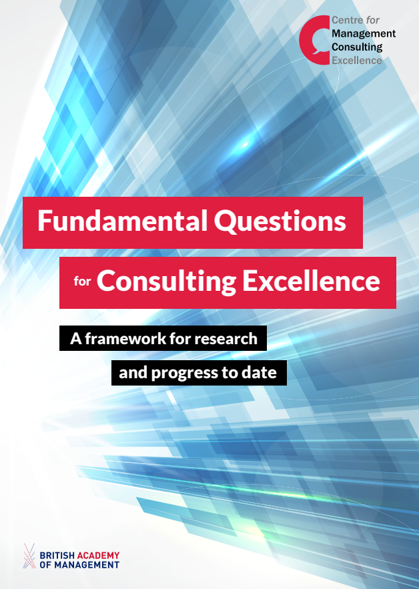I was delighted with this month’s Centre for Management Consulting Excellence’s publication of “Fundamental Questions for Consulting Excellence: A framework for research and progress to date” in association with the British Academy of Management. I was pleased that we took an approach back in 2021 that riffed off of Hilbert’s Problems. In short, the important thing is to pose the questions.
In turn, this approach riffed off Long Finance’s Meta Commerce programme in 2007. Meta-Commerce too aims to identify and structure the critical questions underlying the long-term viability of the financial system.
Inspired by David Hilbert’s 23 questions project of 1900, the Meta-Commerce programme brings together financial experts across a range of disciplines with a view to producing a framework of questions in order to prioritise future research and direct action. Ideally this framework should take the form of a network of related questions, an ontology if you will.
By helping to identify a set of core questions that link economics, finance and society, and that need solving in order to have a working financial system, Meta-Commerce maps the road to Long Finance and contributes to its overarching goals – to expand frontiers, change systems, deliver services and build communities. Long may Hilbert’s formulation of an approach inspire as much questioning as his mathematical questions ultimately did.
Just what is a management consultant? According to the well-worn cliché, it’s someone who borrows your watch to tell you the time – and then charges you a premium for the service. Yet despite this apparent cynicism, there has been no shortage of people wanting to buy the services that management consultancies provide. According to figures from the Management Consultancies Association, the market in the UK alone is worth some £20 billion.
Alderman Professor Michael Mainelli, The Rt Hon The Lord Mayor
Yet this growth has come at a cost. Not only does management consultancy remain a mystery to many but there is a growing body of work out to burst the consulting bubble – with books such as The Big Con by Mariana Mazzucato and Rosie Collington accusing it of weakening businesses, governments and even whole economies. Add to this the disruptive impact of the latest AI-powered tools making much advice available for free, you don’t need to be a consultant to think that maybe consulting has a problem?
In 2021 I was asked to join the strategy development panel of the Centre for Management Consulting Excellence to help steer it through its next phase of growth. I felt that some of the questions the panel was asking were perennial ones around topics such as client relationships and ethics that the industry hadn’t really tackled. I suggested that these difficult questions were analogous to the 23 problems that David Hilbert convened leading mathematicians to address back in the early 1900s. Could we pose these questions and assemble some bright minds to address them?
I’m glad to say that CMCE has taken this idea and run with it, editing down the many questions
the panel and other experts came up with into five broad categories and then using these to inform their events and research reports. The result has been the Fundamental Questions for Consulting Excellence that form the basis for this update report.
Nine of Hilbert’s problems remain unsolved and I don’t anticipate these fundamental questions to be answered any time soon. In continuing to address them, and in laying out a framework for further investigation, CMCE has performed a valuable service to management consultants everywhere.
I commend this report you and urge you to debate, engage with, and generally help to progress them.
October 2024

